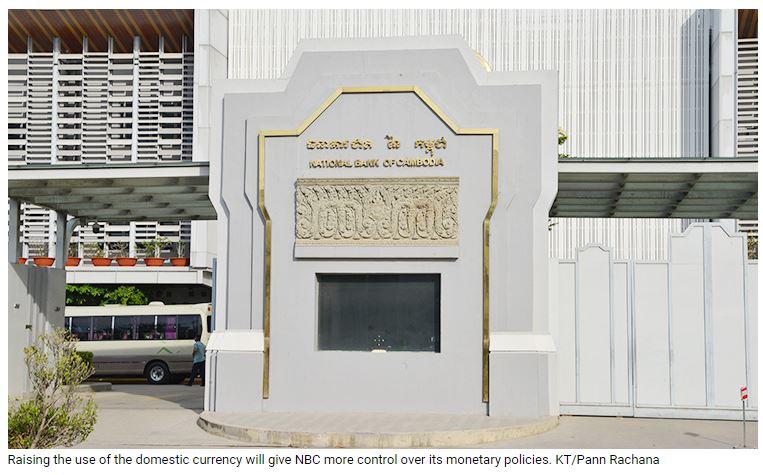Cambodia: Bakong system lends a hand to promote riel usage
The Bakong system, the interbank transaction platform of the country launched by the National Bank of Cambodia (NBC), has helped with the de-dollarization efforts of the central bank through payments using KHQR and also by promoting cross-border payments.
Although digital use of the riel has increased since Bakong’s launch, NBC also stressed that Bakong alone will not enable Cambodia to shift from a US dollar-based economy to one based on its local currency, indicating the need for a sustained and inclusive efforts from stakeholders over a period of time.
Fortunately, international agencies such as IMF have come forward to support NBC’s de-dollarization efforts, expressing readiness to provide technical support for the initiatives of the central bank.
Following the two-week-long annual Article IV consultation for Cambodia, IMF Mission Chief Alasdair Scott told media last year that 90 percent of the bank deposits in the country are still in foreign currency. “Raising the use of the domestic currency will give NBC more control over its monetary policies,” Scott then pointed out.
According to Chheng Kimlong, Executive Vice President of the Phnom Penh-based thinktank, Asian Vision Institute (AVI), the de-dollarisation efforts taken by NBC more than a decade ago have resulted in some positive outcomes.
There has been an increase in overall usage of Cambodian riels such as in deposits, transactions and loans due to the incentivization for the use of the riels vis-a-vis the dollar or other currencies, Kimlong told Khmer Times.
“De-dollarization has also resulted in the liberalization in the use of other currencies in international trade,” he said.
Asked whether de-dollarization has had any negative impact on Foreign Direct Investment (FDI), as feared by some investors, he said that this was not proven yet. “FDI inflows continue to remain hugely in the form of foreign currencies, not only in US dollars but also in Chinese yuan, depending mostly on the sources and their preferences at the time of the decisions taken by investors,” Kimlong pointed out.
“Way forward, Cambodia should embrace a gradual process of de-dollarization or in other words, a pragmatic approach to stabilizing the value of Cambodian riels without adversely discouraging the Cambodian exports as far as exchange rates are concerned,” he said.
Such a policy will also help promote the attractiveness of Cambodia as a destination for FDI and also as a manufacturing hub, Kimlong reasoned. “Ensuring the stability of the Cambodian riel can be an effective policy option,” he maintained.
Meanwhile, the Bakong system has gone a long way in enhancing the interconnectivity and interoperability of banks, financial institutions, and payment service providers in the country, helping the increased usage of riel for transactions. This has also helped people to make banking transactions safely during the Covid-19 pandemic and promote financial inclusion. By using the blockchain technology, it is also considered highly secure.
Using distributed ledger technology (DLT), Bakong is a backbone payment system that aims to enable interoperability among banks, financial institutions, and payment service providers, enhance efficiency in payment systems, promote financial inclusion, and encourage the use of cashless payments in local currency. The system has been recognised regionally and globally as the first central bank payment system using blockchain technology.
In April 2021, the PwC CBDC global index ranked Cambodia’s Bakong project first in Asia and second in the world for retail projects just after Bahama’s Sand Dollar. Moreover, in January 2022, the system won one of Asia Nikkei’s Awards for Excellence for its innovative technology and impact on the country’s economic and social development.
In 2021, the total value of transactions through the Bakong system was recorded at KHR 14.3 trillion with 8.2 million transactions. Also in 2021, the total value of online payments using e-wallet accounts expanded by 17.3 percent to almost KHR200 million with 343.8 million transactions, according to the Financial Stability Review 2021, released by NBC.
Advancements in financial technology and the rapid adoption among the public have also encouraged more banks and financial institutions to develop and provide online services to enable customers to perform a wide range of digital banking operations including loan repayments, fund transfers, bill payments, phone top-ups, payrolls, and balance inquiries.
In 2021, the value of internet banking doubled to KHR90.1 trillion with 4.4 million transactions and that of mobile banking increased 28.6 percent to KHR28.9 trillion with 254.1 million transactions, the Financial Stability Report said.
Going forward, the NBC will enhance regional financial connectivity, particularly with the ASEAN member states, to deepen regional integration and cooperation through cross-border payments to facilitate trade, e-commerce, tourism, and remittances as well as to promote financial inclusion.
Furthermore, NBC is also studying the use of the Bakong system for large value payments by strengthening the efficiency and security of gross settlements in the Cambodian financial system in line with regional and global developments.
Source: https://www.khmertimeskh.com/501275493/bakong-system-lends-a-hand-to-promote-riel-usage-2/


 Thailand
Thailand




